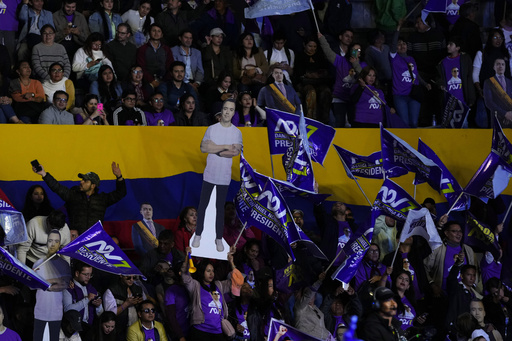GUAYAQUIL, Ecuador — In Ecuador, residents can easily recount their encounters with crime, detailing harrowing experiences from public buses to parks, sidewalks, cabs, malls, and nearby restaurants. They have grown accustomed to recounting their losses, which range from their monthly earnings to multiple cellphones and wallets. This pervasive cycle of victimization has escalated over the last four years of increasing violence, and now it shapes their voting decisions as they prepare to choose the future of their leadership.
As voters anticipate the upcoming election, many reflect on the lack of improvement since violence spiked. Briggitte Hurtado, a 23-year-old jewelry vendor, expressed frustration one evening as her stall in Guayaquil’s boardwalk stood empty. “People used to engage more in the area,” she noted, highlighting her uncertainty about who to support at the polls.
Hurtado’s skepticism toward President Daniel Noboa’s leadership stems from her own traumatic experiences since he took office in November 2023. She was robbed twice after leaving work last year and endured a terrifying four-hour ordeal in a taxi, during which she and her boyfriend were coerced into allowing the driver to withdraw $800 from an ATM.
The surge in violence in Ecuador is linked to the cocaine trade flowing from Colombia and Peru. The presence of powerful drug cartels from Mexico, Colombia, and Europe, along with local gangs, has exacerbated the nation’s crime rates.
The upcoming ballot will feature 16 candidates, with Noboa seeking re-election against leftist lawyer Luisa González, whom he defeated in a snap election following the dissolution of the National Assembly by former president Guillermo Lasso. Both candidates entered the presidential race after short tenures as lawmakers. González, a protégé of former President Rafael Correa, stands as one of the primary contenders alongside Noboa.
To win outright in the election, a candidate must secure either 50% of the votes or at least 40% with a 10-point lead over the nearest rival. If none achieves this threshold, a runoff will occur on April 13.
Analysts note that public sentiment about Noboa is complex; while some question his efficacy, many voters are hesitant to return to the policies associated with Correa’s governance. Will Freeman, a fellow at the Council on Foreign Relations, emphasized that concerns about reverting to “Correismo” might bolster Noboa’s appeal, even as some voters express less enthusiasm for him personally.
González, 47, previously held various governmental roles during Correa’s presidency and served as a lawmaker until earlier this year. She rose to prominence after being selected as her party’s candidate, despite being largely unknown prior to her candidacy.
Noboa, 37, is the heir to a banana trade fortune and began his political journey in 2021 when he won a seat in the National Assembly. He has built a reputation for aggressive crime-fighting strategies—his tenure saw a decrease in homicide rates from 8,237 in 2023 to 6,964 last year. Nonetheless, this figure remains significantly higher than the 1,188 recorded in 2019. Kidnapping cases increased slightly, from 1,643 in 2023 to 1,761 through November 2024.
Despite his tough stance on crime, Noboa has faced criticism over his approach to governance. He declared a state of emergency in January 2024, allowing military involvement in crime hotspots. His controversial actions included authorizing a police raid on the Mexican embassy in Quito to detain former Vice President Jorge Glas, a fugitive involved in a corruption case.
Additionally, Noboa transferred certain presidential powers to a government official while he campaigned, igniting a feud with Vice President Verónica Abad. Their discord intensified after Noboa assigned Abad to serve as ambassador to Israel, which she labeled as “forced exile.”
Mandatory voting laws in Ecuador mean that every citizen must participate. Recently, thousands of inmates awaiting sentencing voted from special centers set up in over 40 prisons. In Guayaquil, where violence is rampant, some voters opt for blank ballots to express their discontent with the options available.
Among them, Dario Castro plans to cast a blank vote. Last year, he faced multiple bus robberies, and his brother was kidnapped. He sees a bleak choice ahead: “You either make a pact with the mafia or confront it decisively; otherwise, the people will remain unprotected,” stated Castro, 46.



